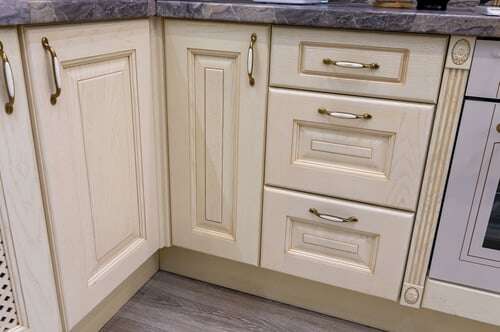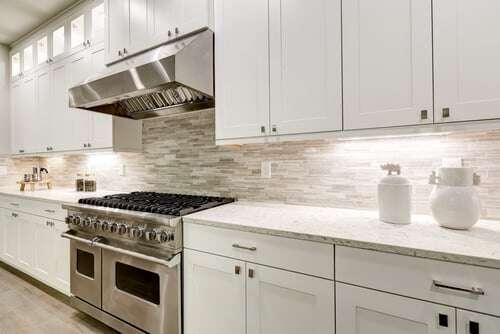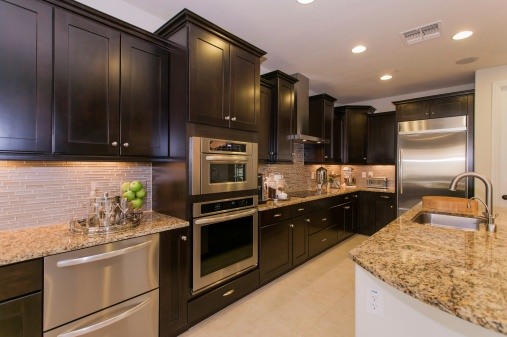 When it’s time to upgrade your kitchen or if you are building a new construction home, one of the decisions you have to make is what type of kitchen cabinets you want to install. Kitchen cabinets take up a lot of space and are a very visible part of your kitchen. They also get a lot of use so you want your kitchen cabinets to not only look good, but to be well built and functional for years to come.
When it’s time to upgrade your kitchen or if you are building a new construction home, one of the decisions you have to make is what type of kitchen cabinets you want to install. Kitchen cabinets take up a lot of space and are a very visible part of your kitchen. They also get a lot of use so you want your kitchen cabinets to not only look good, but to be well built and functional for years to come.
Most people don’t think a lot about something like kitchen cabinets until it’s time to make a decision during a remodel or new construction. If you’re in the process of installing new kitchen cabinets or will be soon then the following suggestions are for you! Not installing a new kitchen yet? No worries, it’s always good to learn and be prepared for when the time comes down the road.
Here’s some advice from the Curbed Guide to Choosing Kitchen Cabinets:
"To breakdown the basics, we turned to New York City-based interior designer Keita Turner. Here, she offers advice on everything from determining which type of cabinet construction is right for you to how to maximize storage and make open shelving look good.
Cabinet types
Start with the basics. First, determine if your kitchen will include all or some of the four basic types of cabinets: base (under the counter), wall-mounted, tall (often standalone, can be used as a pantry), and specialty units like corner cabinets, hutches, or bottle racks.
You’ll also need to choose a cabinet quality grade. Budget will be a determining factor here. There are four cabinet grades available, based on construction quality:
- Ready-to-assemble (RTA) cabinets are found at big box retailers like Ikea. RTA cabinets can save you money, but they will be less durable. Building and installing cabinetry isn’t as simple as building a shelf or bed, so even skilled DIYers may need to hire professionals for the installation.
- Stock cabinets are bought directly from the manufacturer. You have less flexibility with these since they are sold in specific sizes that can not be changed, but you can find stock cabinets in a wide range of materials. They are generally an affordable choice, with a higher quality than RTA.
- Semi-custom cabinets hit in the middle in terms of price. These could be stock cabinets made with custom doors and shelving or made-to-order units from a manufacturer. You can specify size and choose from a broader selection of materials.
- Custom cabinets are at the highest end of the spectrum and offer unlimited options. They are completely made-to-order, and you can dictate all of the materials, hardware, style, and construction.
Choose the construction
There are two types of cabinet construction. Framed cabinets have rails and stiles that form a 1.5-inch face frame at the front of the cabinet box that is attached to the door front to give extra strength and dimension to the finished cabinet. With this construction, you have more flexibility with door types; it allows for standard, full overlay, and inset cabinet doors (more on door types below).
Frameless construction is a European method of manufacturing cabinets that has become increasingly popular with American homeowners. It offers a more contemporary look and better interior access by excluding the face frame, relying on denser box construction for stability. "Only full overlay doors can be used, with hinges attached directly to the sides of the cabinet box," notes Turner.
Style glossary
There are dozens of different cabinet styles, but choosing a construction and door type will help narrow the options. "I tend to prefer modern to transitional cabinet styles," says Turner. Transitional cabinets, like a transitional kitchen, are considered a blend of traditional and contemporary styles.
"Depending on the architectural style of the home and taste preferences of my clients, I typically will select from slab, flat panel, shaker, raised panel, or beaded door styles." Other popular styles include glass inset, mission, and arched cathedral.
Arched cathedral: The door panel is shaped like an arched window. The shape can be recessed or raised within the door frame. This style is typically reserved for upper wall cabinets.
Beaded: The interior panel features stripes created by a single or double groove (these are known as beads in woodworking). Beaded panels can be combined with other styles.
Flat panel: Exactly what it sounds like—the door has a single flat panel surrounded by molding. It’s the preferred style for transitional kitchens.
View more styles here.
Doors versus drawers
"If you are trying to maximize your storage and provide easier access to your dishes, tools, and foodstuffs, I definitely recommend going with as many base cabinet drawers as possible," says Turner. "Drawers offer a much better use of space, particularly deep drawers, which are an optimal solution for storing pots, pans, dishes, and other cookware."
View the full Curbed Guide to Choosing Kitchen Cabinets here.
Those are a few tips when choosing kitchen cabinets for your new home or home renovation. If you would like more help and want to get a free quote for your kitchen our general contractors at Experts In Your Home are at your service. For more home related resources, subscribe to our blog.








